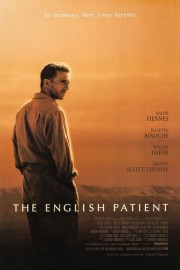The English Patient
In a year where the Oscars went with some of the most unconventional films in recent memory, they went with the most obviously predictable choice. No, I am not referring to the Oscars that just passed, where “Nomadland” won, but when “The English Patient” won out over “Fargo,” “Secrets & Lies,” “Shine” and “Jerry Maguire” to net Miramax its first Best Picture Oscar. Now, does anyone even think about it, except in perspective of the “Seinfeld” episode where Elaine hates the film? Is it even worth remembering? Even after my first rewatch of the film since 1997, I’m not entirely sure.
Actually, I can answer that last question- “The English Patient” is worth remembering. Directed by Anthony Minghella, who adapted the book by Michael Ondaatje, the film has a romantic soul while constantly showing the heartbreak of love, and the pain of war. It has a sense of adventure at times that makes it feel like a successor to “Lawrence of Arabia,” as well as strong performances all around. Minghella and his craftsmen- especially editor/sound maestro Walter Murch and cinematographer John Seale (both of whom won Oscars for their work)- have a full commitment to constructing Ondaatje’s complex narrative for the screen, and it never becomes difficult to follow. It doesn’t exactly move at a strong pace, though; it’s easy to see why Elaine was just wanting the titular character to die already. There is much to recommend here.
The film begins with a plane crash. One of the passengers has died, the other one is alive, but horribly disfigured. We will find out that this is Count Laszlo de Almásy (Ralph Fiennes), and he is being treated by Hana (Juliette Binoche, who won an Oscar for her role), a nurse who’s lost loved ones to the war raging. The Count is unable to be moved easily, so he and Hana are dropped off at a bombed out monastery. She cares for him, reads to him, and- after his memory starts to return to him- he recounts his story; Almásy is member of the Royal Geographic Society, on an expedition to map the Sahara Desert, which started before the outbreak of WWII. While on the expedition, Almásy met Katharine Clifton (Kristen Scott Thomas), who is unhappy in her marriage with Geoffrey (Colin Firth). Almásy and Katharine begin a torrid affair which will, in the end, destroy them both.
Minghella’s film moves effortlessly between past and present, with Murch’s artful editing, in one of the most beautiful epic visions of the modern age. While at the monastary, Hana and Almásy receive visitors- two members of a bomb squad (including Kip, a Sihk officer played by Naveen Andrews) and Caravaggio (Willem Dafoe), who might know more about Almásy than he claims to know himself. Hana is the heart of the movie, especially when her and Kip become involved with one another; she is empathetic towards people because of what she’s been through. What does she make of Almásy’s story? The compelling thing about how Minghella and his actors play it is that they really aren’t an sympathetic couple- Almásy keeps himself at a distance and Katharine ultimately seems to go back to her husband, regardless of how she feels about him- but it’s played with the grandeur of a great epic romance, but that will happen when what stokes their passions is surviving a brutal sandstorm, in one of the film’s most riveting sequences. When Caravaggio enters the picture, the big picture of Almásy’s story gets muddied; is Almásy responsible for what led to Caravaggio’s thumbs being cut off by the Nazis? Minghella keeps us guessing until the end.
Even though the structure of the film is that of an epic mystery, “The English Patient” ultimately rises and falls with each scene, its momentum ebbing and flowing. Part of the reason this hasn’t stayed with me in the same way his next film, “The Talented Mr. Ripley,” has is because this film’s strongest moments (the sandstorm, Caravaggio’s story, a bomb defusal scene with Kip) outweigh so many other moments in the film, killing the momentum of the storytelling Minghella is trying to achieve. Personally, I wasn’t really engaged by Almásy and Katharine’s romance nearly as much as I was when Hana was onscreen; her story is the most poignant in the film, and I understand better why Binoche won the Oscar for her role. As for the film? It’s one of many Best Picture winners that, while well made (sometimes, masterfully so), won over more deserving selections.
Elaine was too hard on this film.










